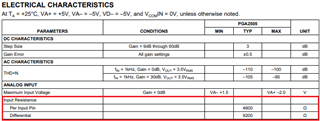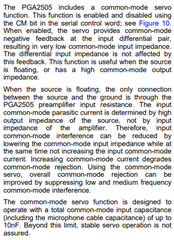Tool/software:
Dear
How to calculate the input impedance of PGA2505?

This thread has been locked.
If you have a related question, please click the "Ask a related question" button in the top right corner. The newly created question will be automatically linked to this question.
Hi Liu,
How to calculate the input impedance of PGA2505?
The input DC resistance (4.6kΩ/input_pin) is specified in the datasheet, see the table below.

This measurement may refer to the open loop input impedance. In a closed loop(Acl), the open loop (Aol) input impedance has to multiply by (1+T), where T = Aol/Acl or the loop-gain. Typically Aol for audio application should have at least 100dB or greater. So in a practical application, the input impedance should be higher, 4.6kΩ*T_loop_gain per input pin in a closed loop. As the closed loop gain, Acl increases, the loop_gain T decreases. The differential input impedance will be 2X higher than input pin's impedance, likely the analog front end has instrumentational amplifier topology. So the input impedance changes with the gain - this is how the input impedance is calculated.
The PGA2505 did not provide the information in the datasheet. Unlike traditional high-impedance op-amp inputs, the PGA2505 has a relatively low input impedance (~2 kΩ at 0 dB gain). PGA2504 is an active pre-amplifier, leading to a lower input impedance (it does not use a transformer for microphone coupling).

PGA2505 is designed for studio microphones, especially dynamic microphones, expect to see an input impedance between 1 kΩ to 3 kΩ for input impedance matching. A lower input impedance can help damp resonances, control noise, and provide a predictable loading effect. A lower input impedance can also improve CMRR by ensuring better impedance matching between the differential inputs, and reduce interference and noise pickup for professional audio applications.
If you have additional questions, please let me know.
Best,
Raymond
Hi Liu,
I am going to close this query, since I have not heard from you.
If you have other questions, please let me know.
Best,
Raymond